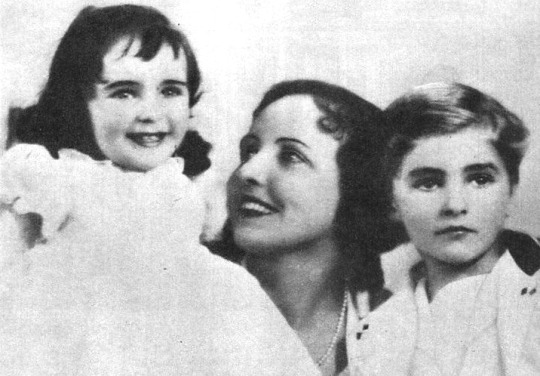Em qualquer carreira,
é raro começar no topo. No cinema, em especial, é raro começar como
protagonista de um filme. A maioria, se não todas, as lendas do cinema
começaram em papéis secundários, alguns até sem fala. Elizabeth Taylor também
começou pequena – de ambas as maneiras: ela tinha apenas 10 anos quando fez seu
primeiro filme, “There’s One Born every Minute”, que é um exemplo perfeito de
filme B.
You rarely get to start
on top in any career. In film, especially, it's rare to start as the star of a
big picture. Most, if not all, film legends started in secondary roles, some of
them as extras, others as walk-on roles. Elizabeth Taylor also started small –
in both meanings: she was only 10 when she did her first film, and this film,
“There's One Born Every Minute”, is a perfect example of a B-picture.
Curiosamente, a
personagem de Elizabeth, Gloria, diz a primeira frase do filme: “Este cara
engraçado é meu tataravô Claudius?”. Ela se refere a uma pintura que sua mãe,
Minerva (Catherine Doucet) está pendurando na parede. A pintura está ali para
inspirar grandeza, porque o pai de Gloria, Lemuel Twine (High Herbert), se
candidatou ao cargo de prefeito da cidade de Witumpka Falls.
Curiously, Elizabeth's
character, Gloria, says the very first sentence in the movie: “Is that
funny-looking bloke (=man) my great-great-grandfather Claudius?”. She is
referring to the painting her mother, Minerva (Catherine Doucet) is hanging on
the wall. The painting is there to evoke greatness, because Gloria's father,
Lemuel Twine (Hugh Herbert), is running for the position of mayor of the city
of Witumpka Falls.
Gloria é a filha mais
nova. Sua irmã mais velha Helen Barbara (Peggy Moran) é uma adolescente e seu
irmão Junior (Carl ‘Alfalfa’ Switzer) é pouco mais velho que ela. O papai
Lemuel ganha dinheiro fazendo pó para preparo de pudim – e age como um
cientista maluco enquanto mistura os ingredientes, em busca do pudim perfeito.
O pudim perfeito pode não existir, mas pode ser anunciado – e é isso que o
marketeiro de Lemuel, Jimmy Hanagan (Tom Brown) faz: ele inventa uma nova
vitamina, chamada Zumf, que é extremamente benéfica e que só é encontrada nos
pudins de Lemuel.
Gloria is the youngest
kid. Her older sister Helen Barbara (Peggy Moran) is a teenager and her brother
Junior (Carl 'Alfalfa' Switzer) is just a little older than her. Daddy Lemuel
makes pudding powder for a living – acting like a mad scientist while mixing
the ingredients in search of a perfect pudding. The perfect pudding may not
exist, but you can certainly advertise it – and that's what Lemuel's
advertising assistant, Jimmy Hanagan (Tom Brown) does: he makes up a new
vitamin, called Zumf, that is extremely beneficial and can only be found at
Lemuel's puddings.
As vendas do pó para
pudim aumentam vertiginosamente – e a popularidade de Lemuel também. O rico
vendedor Lester Cadwalader (Guy Kibbee) não fica feliz com isso, porque ele
está do lado do atual e estúpido perfeito, e precisa arranjar um jeito de
sabotar a campanha de Lemuel. Lemuel não é um homem muito esperto, e deverá
contar com a ajuda de seus ancestrais para fugir da sabotagem e continuar a ter
chance na eleição.
The sales of pudding
powder skyrocket – and so does Lemuel's popularity. Rich shop owner Lester
Cadwalader (Guy Kibbee) is not happy with it, because he is supporting the
current stupid mayor for re-election and must find a way of sabotaging Lemuel's
campaign. Lemuel is not a very bright man, and must count with the help of his
ancestors to escape the sabotage and compete fairly in the election.
Por causa do tema da
eleição, podemos dizer que “There’s One Born Every Minute” é como uma versão
pobre de “Herói de Mentira” – se “Herói de Mentira” estivesse drogado. É um
filme engraçado, com um final muito machista e diversos momentos esquisitos.
By the election theme,
you can say “There's One Born Every Minute” is like a poor version of “Hail the
Conquering Hero” - if “Hail the Conquering Hero” was in an acid trip. It's a
humorous film, with a very sexist ending and many weird moments.
Elizabeth Taylor não
tem muito que fazer. Ela é a irmã levada, que vive correndo e importunando o
irmão. Ela é fofa e divertida, e nada mais. De fato, seu primeiro empregador,
Universal Pictures, não sabia o que fazer com ela – um diretor de elenco disse
que ela tinha “olhos velhos demais para uma criança” e Elizabeth achava que ela
intimidava os adultos no set – e após apenas um filme o estúdio a dispensou.
Elizabeth Taylor doesn't
do much. She is the brat sister, running around and teasing her brother. She is
cute and funny, and nothing else. Yet, she is wasted in this film. Indeed, her
first studio, Universal Pictures, didn’t know what to do with her – one casting
director said she had “eyes too old for a child” and Elizabeth thought she
intimidated the adults on set – and after only one film they let her go.
Elizabeth era perfeita
para ser uma estrela de cinema desde a infância: com cabelos pretos e olhos
violeta, ela era uma criança que se parecia com um anjo único e exclusivo. Seu
pai, Francis, era dono de uma galeria de arte. Sua mãe, Sara Sothern, foi atriz
da Broadway e deixou os palcos quando se casou. Ambos os pais eram americanos,
mas Elizabeth e seu irmão mais velho nasceram em Londres. A família voltou para
os EUA em abril de 1939, devido ao clima político tenso na Europa. Dois anos
depois, Elizabeth deu início a sua carreira no cinema.
Elizabeth was tailor-made
(HA!) to be a movie star since childhood: with black hair and violet eyes, she
was a kid that resembled an unusual angel. Her father, Francis, was an art
dealer and gallery owner. Her mother, Sara Sothern, was a Broadway actress who
left the stage after getting married. Both were Americans, but Elizabeth and
her older brother were born in London. The family left for the US in April
1939, because of the tense political situation in Europe. Two years later, Elizabeth started her screen
career.
 |
| Elizabeth, mother Sara and brother Howard |
Em 1943, já contratada
pela MGM, a pequena Elizabeth apareceria, mais uma vez sem receber créditos, em
“Jane Eyre” como uma garota sofredora no orfanato, e como Priscilla em “A força
do coração”. Seu maior sucesso viria no ano seguinte. Elizabeth Taylor dizia
que sua infância acabou quando ela se tornou uma estrela, e ela com certeza
sofreu um bocado durante a carreira – mas isto é uma história a ser contada em
outra ocasião.
In 1943, already signed
by MGM, little Elizabeth would appear, once again uncredited, in “Jane Eyre” as
an ill-fated girl at the orphanage, and as Priscilla in “Lassie Come Home”. Her
biggest success yet would come the following year. Elizabeth Taylor said that
her childhood ended when she became a star, she certainly suffered during her
career – but that’s another story.
This is my contribution to the Elizabeth Taylor blogathon, hosted by Crystal at In the Good Old Days of Classic Hollywood.




Interesting beginnings for a talented girl who became a remarkable woman.
ReplyDeleteI would love to see this film and Elizabeth Taylor in it. Even if it isn't her best. It's fascinating to see her childhood films.
ReplyDeleteI'M CURIOUS, DOES THIS FILM ACTUALLY EXIST? I HOPE IT HASN'T SUFFERED THE FATE OF SO MANY OTHER FILMS LIKE BEING LOST
ReplyDelete